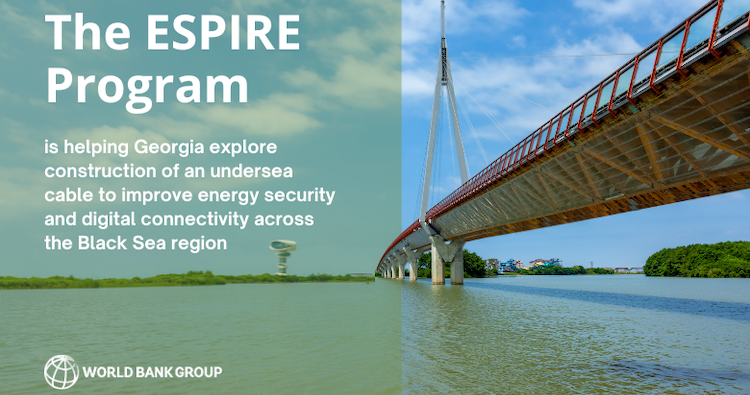World Bank approves $35mln for Black Sea submarine cable project preparatory work

The World Bank has approved a $35 million investment for preparatory work for the Black Sea submarine cable. Photo: World Bank
The World Bank has approved a $35 million investment for preparatory work for the Black Sea submarine cable, an international project that aims to create a new transmission route to deliver green energy from the South Caucasus to Europe, the Bank said on Wednesday.
Specifically, the money has been allocated for the first phase of the Enhancing Energy Security through Power Interconnection and Renewable Energy Programme for Georgia.
The Bank said the programme would support the work for the project that would establish parallel electricity and fibre optic submarine cable interconnections across the Black Sea, with landing points in Georgia and Romania.
Rolande Pryce, the World Bank Regional Director for the South Caucasus, said the programme could “play a pivotal role” in realising “one of the most strategic and ambitious” energy and digital connectivity initiatives in the wider region.
The Black Sea submarine cable project has potential to become a transformational interconnection between the South Caucasus and Southeast Europe, helping the countries from both sides of the Black Sea to improve energy security, decarbonise energy supply and develop renewable energy, as well as increase direct digital connectivity”, Pryce said.
Georgian Economy Minister Levan Davitashvili said the first phase of financing was “fundamental” for further development of the project that was initiated by Georgia.
Implementation of the BSSC project implies a boost for large-scale infrastructure in the country, the creation of jobs and increased investments in Georgia’s economy. With the project, Georgia will become a very important partner country of the European Union and this will contribute to the strengthening of the energy security of the [EU, the country] and the entire South Caucasus region, the development of the renewable energy sector and the increase of transit opportunities between the regions”, Davitashvili said.
The Finance Minister of the country, Lasha Khutsishvili, said the project would strengthen Georgia’s role as a reliable transit country and exporter of renewable energy from the South Caucasus to the EU, contributing to the diversification of energy sources and the development of regional transport corridors.
The project is viewed as a significant step towards closer integration between the South Caucasus region and the EU, fostering economic growth, development and connectivity across the region”, he said.
The ESPIRE Programme is set to develop in three phases with a potential financing envelope of up to $500 million that seeks to improve the country’s institutional capacity for the development of submarine cable projects, strengthen its domestic power transmission system and establish a direct electricity interconnection between the South Caucasus and southeast Europe.
The World Bank said the first phase of the programme aimed to find a suitable corridor for the BSSC project and support preparatory activities such as surveys of the Black Sea seabed.
The Bank added Phase 2 would fund strengthening of the transmission grid in Georgia and other countries to enable electricity exchanges if the project goes ahead, while Phase 3 would support financing of the submarine cable and the fibre optic cable component in the same seabed corridor.
 Tweet
Tweet  Share
Share